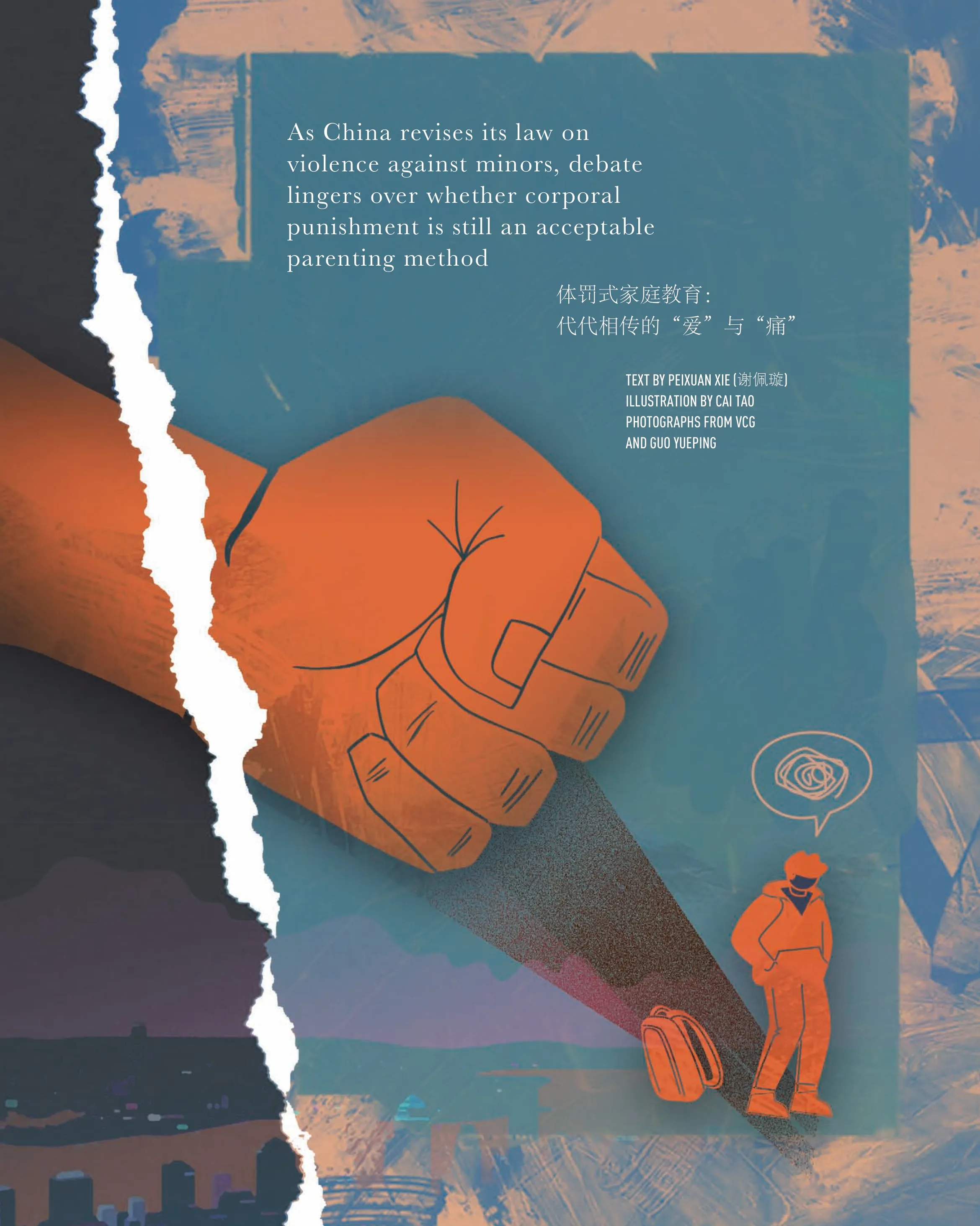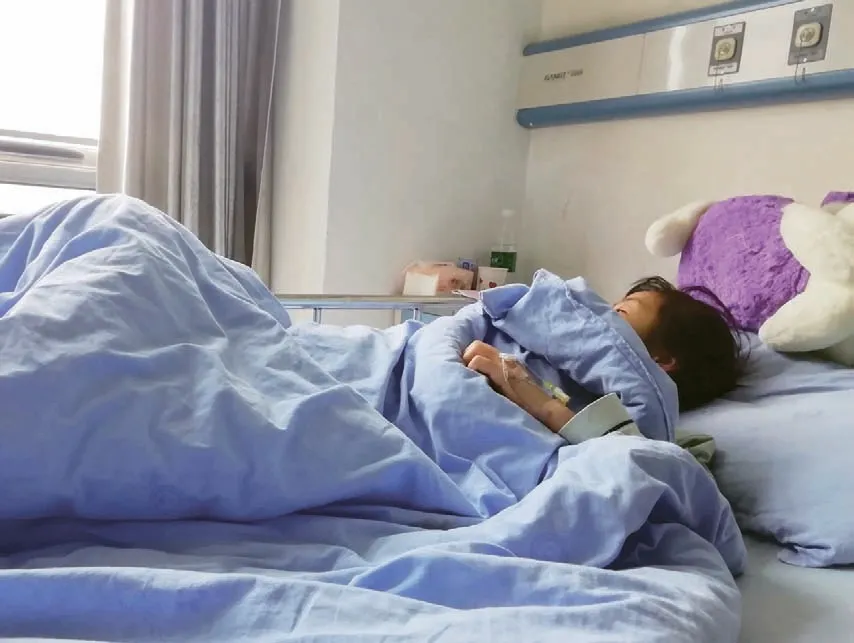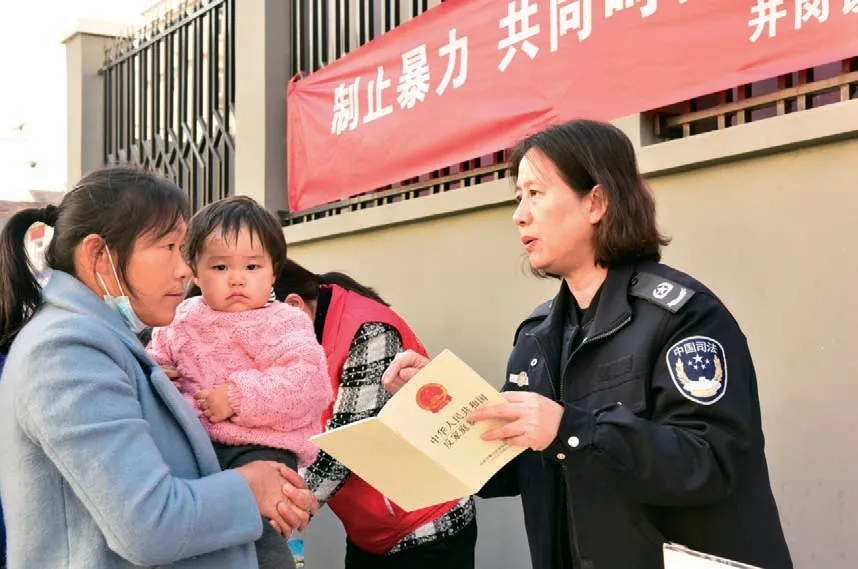TOUGH LOVE

When I ended a routine video call with my mother one recent morning, she in China and I in Germany,something felt different. It took me a moment to realize that it was the first time in my 28 years of life that she had commented on my happiness.“I hope all is well in Frankfurt. Be happy, my little baby,” she had said.All things considered, we don’t have what might be called a cold or distant mother-daughter relationship. In her own words, she is a devoted mother, espousing an eternal and self-sacrificing love for me. I have the same deep feeling for her, though I’ve rarely voiced it.Yet I feel I only know certain sides of her, and doubt she knows much more than that about me. I don’t feel comfortable sharing my life or revealing my feelings to my mother,nor do I always know how to behave around her, and in recent years I’ve started to wonder if it’s because she used to beat me.
Corporal punishment is hardly an experience unique to me in China.Although there’s no comprehensive survey on this topic in China,studies on different regions of the country since the 1990s point to as much as 70 to 80 percent of people who say they’ve received physical punishment at some point in their childhoods, with the most commonly cited reasons being “disobedience to parents,” “poor academic performance,” and “dishonesty.” A 2008 study on high school students in southern China also points to a higher occurrence of physical punishment when parents fight.
The tradition of corporal discipline has been pervasive across centuries in Chinese households, glorified as some traditional wisdom, and preserved and internalized across generations. Much like the English proverb “Spoil the rod and spare the child,” Chinese sayings such as“Filial children are nurtured under the cane (黄金条下出孝子)” and“Without flogging, one cannot have a promising vessel (不打不成器)”indicate that corporate punishment was normalized in times past.
“Some parents who experienced corporal punishment as a child dismiss the potential harm of this practice, as they think they grew out of it and ‘nothing too bad happened,’” says Guo Yueping,program officer on the family protection program team of NGO Save the Children International(Guangzhou Office).
Yet the line between corporal punishment and physical abuse is thin, and recent headlines illustrate the growing awareness of this in China today: In 2018,Pengpeng, a 6-year-old boy from Shaanxi province, died due to brain injuries inflicted by his stepmother,the culmination of a series of mistreatment that started with regular beating and punishment by standing or kneeling.
More recently, in 2022, the parents of a 5-year-old girl in Heilongjiang province were arrested for severely beating the child, leading to fractured bones, intracranial hemorrhaging,and multiple organ dysfunctions, as well as routinely inflicting other grave punishments such as burning her with cigarettes and lacerating her lips.Such headlines led to renewed calls from the public for China to improve its child protection laws.China today is on track to ban all forms of violence against children.From its first law to protect the rights of women and children in 1992 to the revision on the Law on the Protection of Minors in 2020,Chinese legislation clearly outlines the prohibition of violence against children in school, alternative care,and family settings. The widelyapplauded Anti-Domestic Violence Law, issued in 2016, went even further to prohibit psychological violence such as insults, intimidation, and restrictions on personal freedom. China also ratified the UN’s Convention on the Rights of the Child (UNCRC) in 1990 to recognize, among others, the right of the child to live free of violence,and pledged to report to the UNCRC Committee on its children’s rights.
However, corporal punishment remains in a gray area. A 2020 report by End Corporal Punishment, an initiative of the Global Partnership to End Violence Against Children,shows that some of China’s child protection laws do not spell out a scope of violence, attempt to define the place for corporal punishment under the broader violent treatment spectrum, or distinguish it from the“strict discipline” and “correctional education” that parents and guardians are still authorized to carry out under Chinese laws.
Public reaction to extreme cases of violence against children is often swift and condemnatory—in 2010,tens of thousands of enraged netizens called for a life sentence and sent death threats to a woman who beat her 4-year-old daughter to paralysis in Chongqing.
Yet attitudes are significantly more mixed, and even positive, toward routine physical punishments that don’t go to such extremes: such as slapping, spanking, making children kneel, or whipping them with belts or canes. Except in cases of grave violence and abuse cases, corporal punishment is often considered a domestic affair. Lan Yuejun, Professor of Law at Shanghai University,stresses that even when corporal punishment results in serious physical harm, most children, parents, and third parties alike are often unaware of the illegality of the practice.Consequently, there is usually a lack of evidence even when legal actions are initiated.

Jiechi, wooden rods historically used for discipline in Confucian academies, are placed in an elementary schoolclassroom in Sichuan to inspire good behavior; the school states it obtained parents’ permission to do this.
According to Lan, other barriers include the threshold set at “severe”harm, the “private” nature of corporal discipline, and the unclear division of duties among government offices tasked with protecting children’s rights. Unlike in cases of violence against children perpetrated by others, “outsiders” are not normally expected to have an opinion if a parent is “rightly exercising corporal punishment” on the child because it’s “just childrearing.”
China outlined its rules on mandatory reporting in 2020,requiring those working in civil service, law enforcement, education,health care, aid and relief, and other settings with close contact with children to report any suspected cases of sexual abuse, severe physical harm,neglect, trafficking, and psychological maltreatment to the police and local bureaus of civil affairs and education.
However, there’s no clear mechanism for intervening when the level of physical harm is below the threshold for violence. According to Guo, children suffering from severe physical punishment can turn to the Ministry of Civil Affairs’Minors Protection Hotline, social work stations, or municipal minors protection centers, which are established in every city. In some regions, there is also a child welfare inspector who regularly conducts visits to children who are in contact with said institutions. “But admittedly,implementation is uneven and many corporal punishment cases probably go unreported,” she says.

Many domestic violence cases involving child victims have made news headlines in recent years
Personally, I was never aware that there was anyone children could turn to. On the Q&A platform Zhihu,threads from children or teenagers seeking advice on what to do about beatings from parents are often met with responses like, “Bear with it, and run when it gets too much.”
There are few studies in China on how the current generation of young adults who grew up with corporal punishment make sense of their memories. However, a study by researchers from University College London on the experiences and attitudes of 1,255 college students in Zhejiang province in 2015 showed that among the 1,014 respondents who had actual experiences of physical punishment, 763 believed it was “necessary for good discipline,”“not severely harmful,” and therefore justified.
PEOPLE OUTSIDE THE IMMEDIATE FAMILY ARE NOT EXPECTED TO HAVE AN OPINION IF A PARENT IS “RIGHTLY EXERCISING CORPORAL PUNISHMENT.”
In my own case, it was difficult to start making sense of it. Growing up, I spent more time with my mother than any other person, as my father was constantly away for work and spent very little time at home even before their divorce when I was 10.Around the age of 5 or 6, I began to think of my mother as someone who was frequently “not in a good mood.”Her “bad moods” were quick to escalate into something physical.My earliest memory of being beaten by my mother goes back to a windy autumn afternoon. I don’t remember the cause of the beating, but we were both at home, and she sat silently on the sofa looking thoughtful for a moment before standing up, fetching her knitting needles, and calling me over. There was something that I did wrong, she pointed out, as she started to smack me on the shoulders,arms, and back. I remember feeling paralyzed by this first exposure to physical punishment and bursting into tears.
I vividly recall the gray Mickey Mouse hoodie that she was wearing that day, because after seeing me cry,my mother paused for a second, and started to cry even louder than me.She pulled me into her arms, buried her face in my neck and murmured:“I’m sorry. I’m so sorry. Mama is not beating you because you did something wrong. It’s not your fault.Would you forget about it and forgive Mama, please? Please don’t hate me when you grow up.”
“NOT TALKING ABOUT IT” SEEMS TO BE THE NORM AMONG PARENTS AND CHILDREN WHO’VE SPOKEN TO ME ABOUT CORPORAL PUNISHMENT.
But this momentary realization did not prevent my mother from doing this again; instead, she became more“innovative” with her punishments.When I was about 8 years old,my mother caught me watching a playmate pouring yogurt into shoes that were left outside our neighbors’house. That night, she did nothing;I even got to lie on the couch and watch cartoons. Just before lunch the next day, however, when my father went out to run errands, my mother stormed downstairs with a needle in her hand, and within seconds, I felt it pricking my lips.
The pricking did not hurt quite as much as a good lashing, but the memory of it makes me shiver now.While pricking me, my mother asked me time and again if I would ever repeat my wrongdoing. One question,one prick, until 15 minutes had passed—or perhaps it was shorter; I had lost all sense of time. Then she got up to prepare lunch.She told me later that she waited all night to punish me, in order to let me think I got away with my crime and “make the significance of the punishment greater and the memory more lasting.” The wounds from the needle stayed for two or three days afterwards, and we never talked about the incident again.
“Not talking about it” seems to be the norm among parents and children who’ve spoken to me about corporal punishment. Hu Xinyu, a 25-year-old from Jinan, Shandong province, remembers two or three times when her mother punished her physically for either getting bad grades or playing too many video games.“Her methods were smacking me in the face, squeezing me on thighs, or making me stand in cold wind in thin clothes. There was once she made me stand on the freezing balcony in winter for a reason I don’t remember,and I saw her crying inside the sliding door,” she tells me. “Whenever she hit me, she always seemed very upset too. But we never brought it up ever again after.”

A Women’s Federation officer hands out anti-domestic violence pamphlets in Hefei, Anhui province
Hu does not believe that her mother has forgotten about the incidents, but“she probably doesn’t want to think about it or know what to say after all these years.”
Guo, who organizes positive parenting workshops for parents to help them develop healthy, non-violent relationships with their children,says corporal punishment is closely linked to parents’ own mental stress and their lack of knowledge of nonviolent alternatives. “Parents often are unaware of the fact that their mental stress is driving corporal punishment as a means of unleashing their frustrations. In fact, most parents are not happy about using corporal punishment and even regret doing so,” she says, based on her observation from parenting workshops organized by Save the Children. “For example, I’ve known parents who physically punish their child for doing badly at school out of frustration, thinking that it reflects their own failing [as parents]. That’s why we train them to see their own emotions, acknowledge them, analyze them, and control them.”
Guo’s organization, Save the Children, has led “positive parenting” programs for schools and communities, benefiting more than 52,000 parents and children since 2014. The workshops gather parents together to read child protection manuals, learn anger management practices, and discuss parenting challenges and progress. “Many parents resisted in the beginning.Some couldn’t believe their dysfunctional family relations could be helped, and some feared they might still want to resort to beating and scolding after the workshops.But among those who finished the training, our post-workshop monitoring shows increased awareness and improvement toward non-violent parenting,” she says.“Often, there are parents reporting their reuse of violence during the sessions, but with our encouragement they’re able to apologize to their children and do better.”

Positive parenting classes at Save the Children promote better communication,emotional management, and problem-solving between parents and children
As I grew slightly older, my mother told me how, until her late teens, she suffered violence from my grandfather that was “100 times worse” than anything she’d ever doled out to me. She still has not spoken of her lasting grudge to her father, more than 30 years later.“Your grandpa always beat me badly for nothing, just because he might have had a bad day,” goes a story she has told me several times.“When I was 6 or 7 years old, I would go with your uncle and aunts to collect rocks from the riverbank to sell to the cement factory for extra income after school, and I was usually the last to arrive home because I had to carry the stones on my back as well as take care of your youngest aunt. One day, when I came home late again, he came over without saying a word and kicked me in the stomach out the door so hard that I felt I was flying in the air for a few seconds. I could never forgive him for that.”
Indeed, my mother takes a cold,often sarcastic tone when speaking with and of my grandfather. When other people mention him, she frowns and complains. She sends“red packets” full of cash for my grandmother every year and takes her out regularly for dinner, but rarely invites him to join. When both my grandparents developed health and mobility issues in their late 80s, my mother moved only her mother into our house, while giving my grandfather the bare minimum of financial support to continue his treatments at the hospital.
Despite her bitterness toward her own father, my mother holds her own childrearing approach to different standards. “I used to hit you because it’s for your good, for you to remember there are certain things you should not do. I think it was quite successful; you turned out well,” she once told me, partly joking.
When I told my therapist, Dr. Elly
Wong of Oasis Hospital Beijing,about this conversation, she reasoned that having grown up a victim of violence herself, my mother probably unwittingly came to believe in the power of violence as a solution to problems with children, as is generally the case in inter-generational passing of discipline patterns. Indeed, the same dynamics exist between my mother’s brother, who also suffered from the violence inflicted by their father, and his son, my cousin, who was severally physically punished as a child. They are not in regular contact any more.
“THE MOST PRECIOUS THING IS, UNLIKE MOST PARENTS, MY PARENTS NEVER PERCEIVE THEMSELVES TO BE ABSOLUTELY RIGHT.”
In 2021, I sent my friend Mao Lu,a widely read blogger on romantic relationships and personal growth,a long text message confessing how my childhood shaped how I interact with people socially. In romantic relationships, I wrote, I have been constantly and sometimes blindly looking for someone with whom I can be a “happy, carefree, and silly child,” the opposite of my mother’s expectations. Additionally, this sense of having missed out on a happy childhood pushed me to always want to help however I can whenever I sense someone is living with depression or loneliness, even if it’s not my business.“It’s like a redemption, as if making someone else a bit happier is giving the past me a salvaging hug,” I wrote.
Though also born in the 1980s,Lu herself never experienced harsh discipline growing up. “My parents’approach to teaching me lessons is primarily through reasoning. When they told me I did wrong, they would explain why, and how to do it right.There were of course times where I would insist I was right, then we would just debate to see who could persuade the other,” says Lu. “The most precious thing is, unlike most parents,they never perceive themselves to be absolutely right. They have no problem apologizing and admitting mistakes.”

New generations of parents say they want more easygoing and equal relationships with their children
China’s new generation of parents seems to be pushing back against harsh discipline. Various media have taken note of how parents born in the 1990s are raising their children, centering around lower expectations and pressure, encouragement of recreation and freedom, and a light-hearted family atmosphere. Another of my cousins and her husband, a couple in their early 30s who just had a baby boy in August, are firm in their rejection of harsh physical punishment. “If he severely misbehaves, I might still give him some light tapping on the back,but nothing really violent or hurtful. I don’t think violent words or treatments really help children to grow. We’ve all been through it and know it just does not,” says my cousin’s husband.
Lu believes her own parents’doctrine for raising children is based in happiness. “My parents just want me to be happy. Those who believe in discipline and pushing their children to be successful diminish this happinessoriented approach.” To Lu, this has shaped her way of dealing with romance. “It made me see respect as the pre-requisite for any romantic relationship. Just as importantly, it teaches me how to love someone.”
Now that my grandmother has moved in, my mother tries to arrange a video call with the three of us every weekend. We talk about easy topics—work, cooking, energy bills, my cousin’s newborn baby, weekend excursions,and her singing class at the local academy for seniors. Several times,I’ve wanted to tell her that I’m finally writing about her, but I could not bring myself to do so. Perhaps someday I will compile this article into a long letter,and let her read it.

